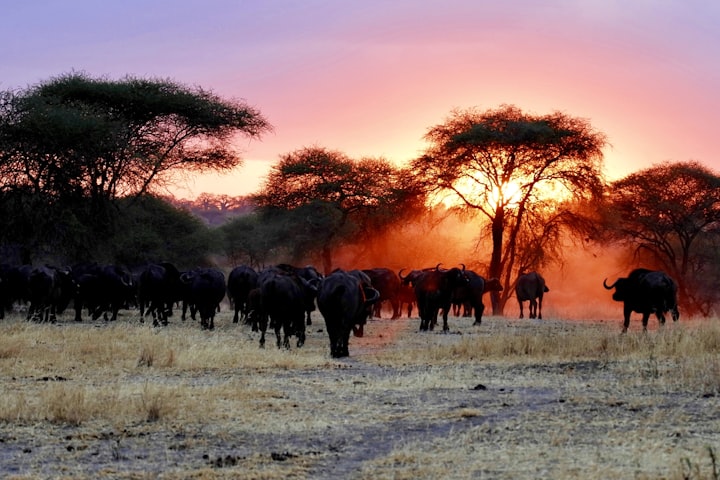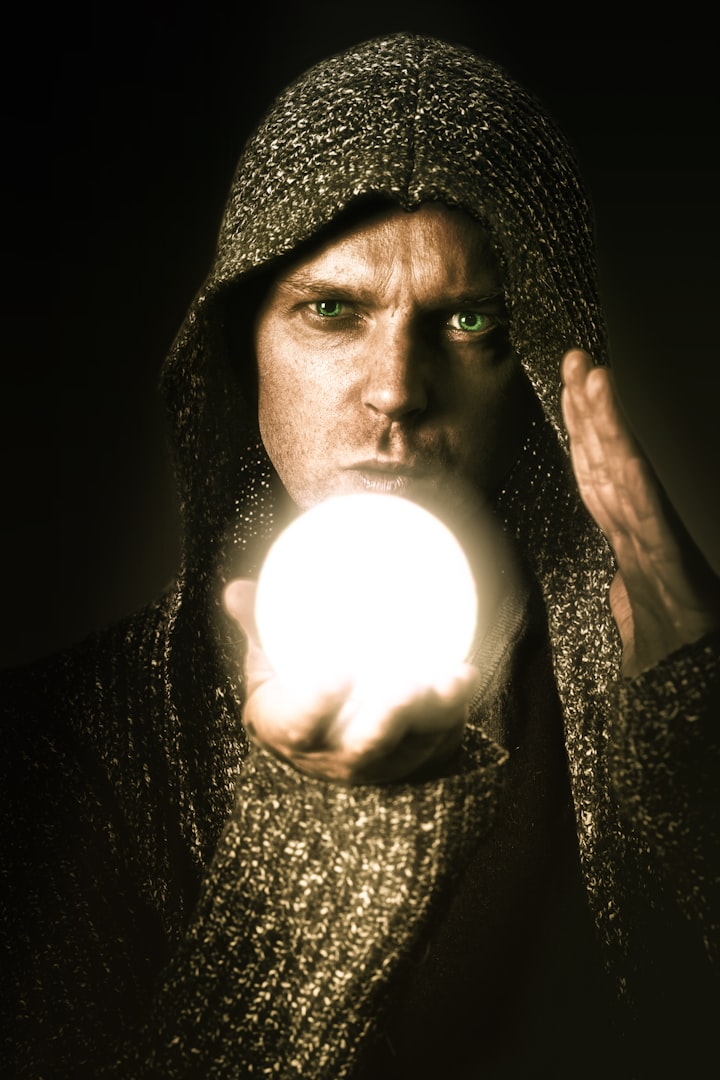The Cape Buffalo
The rich brothers could escape the laws of the land - but not the justice of Society!
You believe that justice has been thwarted, that your efforts to bring your fugitive to custody have been in vain. I believe, Marshal, that I can shed some light on the recent events, if you will bear with me. Although this is a private message, and I have scribbled it down in haste (please be patient with my handwriting, if not my spelling of certain English words), I trust you will be able to elicit some degree of satisfaction from what I am about to tell you.
Of course, I should remind you that it was not within your power to apprehend the three men accused of this crime. Diplomatic powers do not exist, in animal cultures — I did not have to grow up in an African nation to learn this, though Americans, such as yourself, might say, “it did not hurt” — but human ones are able to use them for all sorts of purposes, most of which I believe are of benefit, except for the cover it provides, to those who seek to thwart investigations into criminal behavior. Which brings us to the topic.
I did not know the young man, Mister Cogdill, very well, or for very long, but I recognized him from the photos you showed me. Certainly, he was known to be “active” on the Miami club scene, for at least the past year, and he was quite the big spender, from what he boasted to Kibwe, who was my main “boss” within the Consulate. I was actually in the employ of his father, Jengo, who oversaw all of the Kenyan staff that had traveled to the United States to work for him. My own duties were to assist in the smooth operation of the front office, to greet visitors and to run an efficient schedule. I believe my duties were larger than those of a “secretary”, though I do not object to being called one...
Kenya is an old country, but a new nation. The great moment you Americans experienced in 1783 came just twenty-three years ago, for us — I speak of the breakaway from the British crown, in 1964, which was also achieved through much difficult struggle. Jengo hired me from having known my father, who was a passionate believer in, and a supporter for, Kenyan independence; in the nineteen-fifties (before I was born), they shared admiration for the KLFA, what was called the Kenyan Land and Freedom Party. You in the West might know them better as Mau Mau; though many were Kikiyu, they fought those Kikiyu who supported England. “Subira, get to the point," I can almost hear you saying.
(Did you know that Elizabeth and Philip were visiting Nyeri Township, when they learned that she had inherited the crown, from her father, King George the Sixth? Not a detail many Americans would know, I suspect, but it is a historical irony, in that we Kenyans are a voluntary member of the Commonwealth of Nations.)
I do not believe my father’s role in the Uprising was a decisive or major one, but it brought him into a long friendship with Jengo.While they admired Kenyatta — he was anti-colonial, then he was in exile, before he assumed the presidency — a rebel can make a poor authority figure, as you must know from your many dealings in a law-enforcing role. There is also the sad fact that privilege, often spelled wealth, can corrupt almost anyone, regardless of his color and nationality.Thus we have Jengo’s sons, Kibwe and Mwenye.They availed themselves of all the pleasure and danger that Miami has to offer young men with money, and I think that is where they made a friend, for a brief time, of your fugitive, young Larry Cogdill.
^^^^
Almost certainly, Larry knew his killers socially. It helped them to “ice” him, if I’m not using that expression improperly, without much fear of resistance, and since he did not fear them, he did not contact the police in Miami-Dade — let alone, an even higher authority, such as the one you represent, Marshal Lévesque. Such an interesting French name you have; it’s one of many fine qualities you possess, sir.
We, meaning the victim and I, only spoke at length on one occasion. As I said, my duties mostly consisted of assisting Kibwe, who had just turned twenty-one when I came to work for his father. It was young Kibwe who introduced me to Larry, at a dinner party in Washington, D.C. I was so excited to be in the United States, for the first time in my life, that I could scarcely recall many of the powerful people whom we met, but I do recall my first impression of Larry. He struck me, to put it mildly, as being an imbecile.
He was lucky enough to have been born into money, or so he claimed — though he also chose not to pay for drinks or meals or rides, whenever he was presented with an opportunity to do so. Kibwe warned him not to “get friendly” with me or with the other women who worked for his father; his pride was such that he did not wish to see a white American man take advantage of black Kenyan women, though we did not ask for such protection; but of course, this was not the truth of it. It did not trouble Kibwe, or his brother, to indulge the interest they shared in white American women. I thought it was just hypocrisy. I soon learned it was far more sinister.
I did not set out to uncover anyone’s identity or personal secrets. I was trying to do my job, as best as I could, in a strange land, where I was bombarded by music and speech and politics that differed from my country’s own, but this was not to be my fortune. A late, loud pool party exposed me to an amazing secret: once he had indulged his cocaine habit and most of the other guests had departed, Larry was witness to an incredible sight. Kibwe and Mwenye made an incredible boast: they said they could change their shapes and even their skins, just by thinking of doing so. Larry laughed, and insisted upon proof of this absurd claim.
And then, they did it. Mwenye shrank out of sight inside of his bikini briefs, and a small animal — a black kitten — stepped into view. Only this was not a typical sort of a kitten — it was a leopard’s cub! Larry started to have trouble breathing, what I would have said was the fault of the dangerous drug he was consuming, but the bizarre vision doubled then, with Kibwe bursting out of his swim trunks — now a Vulturine guineafowl stood where he had been.
I watched from inside of the house, behind a bulletproofed curtain. I’m quite sure they didn’t see me, or if they did, weren’t in good condition to notice the danger in which they had just put themselves. They recalled their human forms, laughing at the amazement on poor Larry’s face. He stood as stiff as if he had been paralyzed, which may have been the case. How he did not have a heart attack, from the mix of the coke and this dark mystical picture, I just don’t know, but they slapped him awake, and told him that they belonged to a special order. They used a Luo word, teko, “power” — which is how we name what the English or you Americans would call, “Society”: a community of shapeshifters… a thing deemed false, imaginary, by the rest of the world.
^^^^
I did not see what happened next. I was too frightened to let myself be caught snooping on them, so I flew to my bed.
It was maybe three days later, at the Miami house, when we finally had the pleasure of your company, Marshal. You arrived as a vigilant policeman, in search of a possible witness to criminal acts, but I soon knew that you were fascinating in many ways. You seemed serious, but not grim, possessing the knowledge that only those persons who had encountered Society members transmuting into their major forms could have acquired. Also, and this is somewhat embarrassing to admit, I did think you were quite handsome. I comprehend how some people resist looking their ages, but fifty birthdays? Staggering, if we do not take into account your “other” life —
Of course, I realized: you must be Society. It was not too much trouble to put it together. The way you asked me about the brothers’ habits? It was a clue, that Marshal Lévesque was not just some witless soldier, who just followed orders, and arrested the usual suspects for his superiors. You wanted real answers to what had happened to Larry Cogdill, and you were in a unique position to pursue a pair of shapeshifting murderers.
Do you know, Marshal, why the Cape buffalo is so feared? Because it is quite large, quite well-armed with its huge horns, and — unlike my former employer — quite unschooled in the art of diplomacy. It can weigh — literally — almost a ton and it can stand as shoulder-high as some men. If one were to “appear” rather abruptly, beside the two fugitive brothers, their chances for a long and happy life would, I imagine, be rather poor.
We arrived at the game preserve after hours spent driving north. Before we got there, I recall how you tensed up, behind the wheel, taking the call on your car phone. I remember I joked to you something about, “Was that Crockett with a vital clue, Detective Tubbs?” and you did not even smile. I knew then that Larry Cogdill was dead, of a “misadventure” in the Florida Panhandle.
His body had been rather brutally used, and then abandoned at an anonymous patch of grass and trees, on the edge of the preserve. There was no sign of either brother. Then we discovered that Kibwe and Mwenye had left the country, and that their father’s connections with the embassy blocked further inquiries into their activities. Larry Cogdill’s death was ruled an animal attack, possibly by a panther. Or perhaps, two.
^^^^
I do not believe that you accepted this explanation, even then — and I knew better than to believe it. Larry had made it known that he desired to join the brothers in a hunt, especially of exotic game — and if the trophy were illegal, from a protected animal, so much the better. The idle rich, we are told, have different ideas about right and wrong than the rest of us must hold. Larry was given his wish: Kibwe and Mwenye did invite him to a protected-animal hunt, and that animal was a human being, that person being himself.
I saw you turn into a bloodhound with big, floppy ears, to investigate both the corpse of Larry and the surrounding terrain. Though you had ordered me to remain in the car, you must know by now that I do take a peek at events that concern others; it’s a bad habit, but I am plagued by curiosity, I confess.
It may be somewhat disloyal of me to admit this, but I have enjoyed British works of fiction, especially the detective stories of Arthur Conan Doyle. I do quite enjoy “A Scandal in Bohemia”, as it is a dance of sorts between two powerful minds, the great detective Sherlock Holmes and a woman named Irene Adler. In the end, she manages to outwit Holmes and escape custody, which I imagine nobody else ever did in the history of the character, except perhaps for Moriarty.
You wish for me to reach my conclusion, and it is this. I write to you now, not as a doer of evil deeds, nor even as a sly counterpart to my detective, but simply to put you at ease about the murderous brothers. Your authority as a Marshal may not extend to foreign soil, but as a member of the Society yourself, you may bring the weight of your own powers of shape-changing to the problem.
I know, you won’t leave the U.S. to pursue this matter. Tracking down fugitives — in your own country, from your capital city in Louisiana — is life enough, surely, and burdensome enough, for you. Your career is approaching its end, yes? You’re about to be free. You can choose to travel abroad…
That you can turn yourself into a dog, and back again, Charlie, does not discourage my interest in you. It’s not the first time I have seen this power in others, nor is it a strange quality, for someone to have — even if that someone seemed harmless, even drab, incapable of taking action. Like a secretary, whose “basic form” is a female buffalo of the Sudan, and her brother, Omondi. We will find them. They will know the justice of the horn.
[— From a confidential letter to United States Marshal Charles Lévesque, hand-delivered, 18 September, 1987. Handwriting analysis confirms that the author is Subira Athiambo, a Kenyan national.]
© Eric Wolf 2022.
[Learn more about the Society: https://vocal.media/fiction/the-destroyer-moth.]
About the Creator
Eric Wolf
Ink-slinger. Photo-grapher. Earth-ling. These are Stories of the Fantastic and the Mundane. Space, time, superheroes and shapeshifters. 'Wolf' thumbnail: https://unsplash.com/@marcojodoin.
Enjoyed the story? Support the Creator.
Subscribe for free to receive all their stories in your feed. You could also pledge your support or give them a one-off tip, letting them know you appreciate their work.







Comments
There are no comments for this story
Be the first to respond and start the conversation.